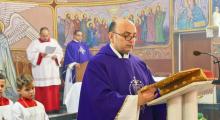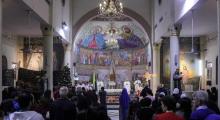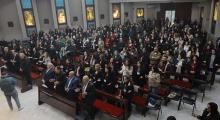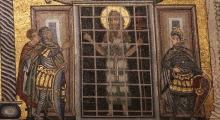Issued by the Catholic Center for Studies and Media - Jordan. Editor-in-chief Fr. Rif'at Bader - موقع أبونا abouna.org

The Jordanian Arabic-language daily Ad-Dustour has conducted an interview with Apostolic Nuncio to Jordan Archbishop Pietro Dal Toso on November 27, 2023.
Following is the text of the interview:
How do you assess the current situation in Palestine, in the Gaza Strip, or even in the West Bank? How does the Holy See view these tragic situations?
Since 7 October, we have been closely following the situation in Israel and Palestine, where violence and suffering are increasing. The number of dead and injured is unbelievably high and the impact on civilians is unbearable. We are particularly struck by the fact that civilian infrastructure is being targeted, and even more so by the fact that the lives of innocent people are in grave danger.
Since the beginning of the crisis, the Holy See has made it clear that the use of violence will not solve the Palestinian question, because violence only generates new violence. The Holy See has also called on everyone to respect humanitarian law and, in accordance with it, to guarantee a ceasefire and to provide the population with what it needs to meet its basic needs. I hope that stopping the war is an absolute priority. I would like to recall the words of Pope Francis in November: “And our thoughts turn every day to the very serious situation in Israel and in Palestine. I am close to all those who are suffering, Palestinians and Israelis. I embrace them in this dark moment. And I pray for them a lot. May the weapons be stopped: they will never lead to peace, and may the conflict not widen! Enough! Enough, brothers! In Gaza, let the wounded be rescued immediately, let civilians be protected, let far more humanitarian aid be allowed to reach that stricken population. May the hostages be freed, including the elderly and children. Every human being, Christian, Jewish, Muslim, of any people or religion, every human being is sacred, is precious in the eyes of God and has the right to live in peace. Let us not lose hope: let us pray and work tirelessly so that the sense of humanity may prevail over hardness of heart”. In addition to public interventions, the Holy See is working through diplomatic channels to promote dialogue to find a solution. Let everyone look at this conflict through the eyes of so many innocent people who are suffering from hunger, thirst, the loss of their homes and loved ones: then maybe something will change. In any case, I see a sign of hope in the fact that in the last few hours an agreement seems to have been reached for a ceasefire and the release of a number of hostages.
Is there an environment for a future solution? What are the principles and constants on which the Holy See relies?
It is worth mentioning that in mid-September, just a few weeks before the tragedy of 7 October, the Secretary for Relations with States of the Holy See, Archbishop Gallagher, presented at the United Nations - in two different sessions - the well-known long-standing position of the Holy See: the two-state solution and a special status for Jerusalem as a holy city for Christians, Jews and Muslims. This is the position of the Holy See, as reiterated in these days by Pope Francis himself and the Secretary of State, Cardinal Parolin.
The two-state solution is the path to which the international community has been committed but which has yet to be fully implemented. The tragic events we are witnessing can perhaps help each of us: we cannot go on fighting each other forever, we must find a way to a peaceful and stable solution. As Pope Francis says, every crisis challenges our responsibility and can become an opportunity for growth.
How do you assess the efforts exerted by His Majeaty King Abdullah and the Jordanian diplomatic efforts employed to stop the aggression?
First of all, we all must acknowledge Jordan's special and positive role in promoting peace and understanding in this region. This role has been played by Jordan for many years and has yielded important fruits for the Kingdom in terms of international respect and national prosperity. Jordan is a place of stability. But of course, there is much more. In line with this position, the Kingdom is making great efforts to promote interfaith dialogue both inside and outside the country. His Majesty has always stressed the importance of the Christian presence in this country: Christians – all Christians – are citizens like any other, with rights and duties to their homeland. In this sense, King Abdullah's role in this conflict, calling for peace and stressing that we all, Muslims, Christians and Jews, must be guided by the principles of humanity, is most valuable and appreciated by the Holy See.
Members of staff of the Jordanian field hospital were wounded. How do you evaluate the humanitarian and medical support provided by Jordan?
During this crisis, as I said, the Holy See has stressed the importance of respect for humanitarian law. Within this framework, it is necessary to provide the population of Gaza with supplies to meet their needs. Jordan has been playing an important role in providing aid for several weeks, and in this regard, I would like to mention the Jordan Hashemite Charity Organization. Caritas Jordan also works with this institution, as a sign of our common concern for human life. But we know that this support is still not enough and must continue with the collaboration of the whole international community. I know that other Church organizations are ready to collaborate in the relief work.
His Holiness met yesterday with a group of Palestinian families from Gaza, while the support was renewed for the suffering human beings to obtain their rights. What is this meeting and what will it bring about the future?
You know, it is difficult to say what this will bring in the future. But as human beings, we also live by signs. This meeting is an important sign that Pope Francis is with all those who suffer, whatever their culture, religion or nationality. In fact, he also met in a separate meeting, with the families of the hostages. We all belong to the same human family: to be brothers and sisters is not enough to live together and enjoy together the gifts that God has given us?
Mankind has always known war. That is true. But humanity has also always seen people of good will working together for a better future. This is the sign that the Holy Father wants to give: let us stay together with those who are suffering, in order to avoid such enormous destruction and pain in the future. The Catholic Church is working towards this goal and is ready to work with anyone who is willing to do so. This is the way forward for this beloved country and for the whole of the Middle East.
The Vatican has a special status all over the world, especially in Europe. How can this status be employed to motivate countries that support Israel to work to stop the Israeli war on Gaza permanently?
First of all, the Vatican is not a state like other states, and it should not be defined as a European state, because the Holy See represents the universal Church, implying all Catholics in all continents, even in the Middle East. The Holy See has two ways to help stop the war. The first lies in the words of the Pope and the Secretary for Relations with States and International Organizations, which had a strong influence. It is the power of the word. Several statements were issued calling on all parties to respect human life and stop the war. The second way is through diplomatic channels, which we do not necessarily notice. There is great activity on the part of the Holy See to stop the war, and I refer here to the Pope’s contacts with the presidents of Palestine and Israel, and with the American president and several leaders around the world, to support efforts to stop the bloodshed.







